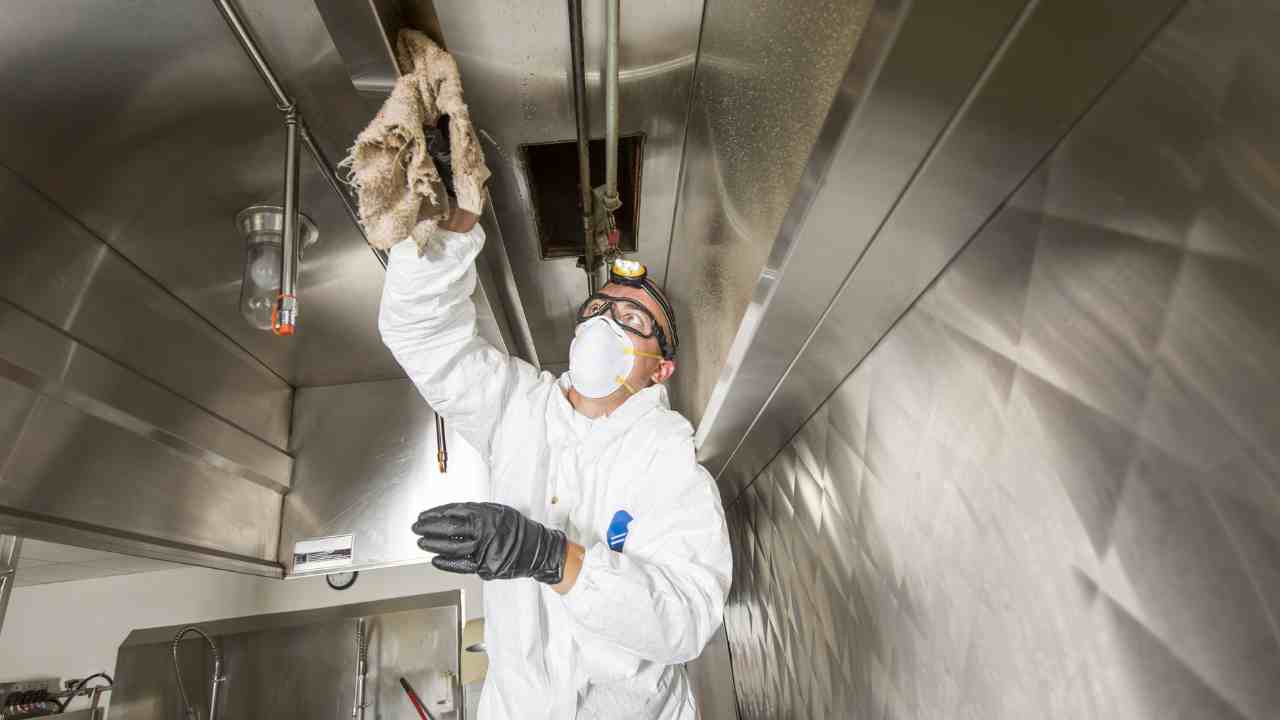Tips To Achieve Efficient Kitchen Exhaust Cleaning

Ontario-wide Kitchen Exhaust and Hood Cleaning – Best prices and service guaranteed.
Keeping a clean and efficient kitchen exhaust system is crucial for the overall safety and functionality of any commercial kitchen. A properly maintained exhaust system not only ensures a healthy and comfortable working environment but also helps prevent fire hazards and comply with health and safety regulations. In this article, we will explore some valuable tips to achieve efficient kitchen exhaust cleaning.
The Importance of Kitchen Exhaust Cleaning
Before diving into the tips, let’s understand why kitchen exhaust cleaning is so important. The kitchen exhaust system plays a vital role in removing smoke, grease, and other airborne contaminants from the cooking area. Over time, these contaminants accumulate in the exhaust system, leading to a variety of issues:
- Fire hazards: Grease buildup in the exhaust system can easily ignite, causing a dangerous fire.
- Poor air quality: A dirty exhaust system can release harmful pollutants into the kitchen, affecting the health of the staff and customers.
- Inefficient ventilation: Accumulated grease can obstruct airflow, reducing the effectiveness of the exhaust system and increasing energy consumption.
- Non-compliance: Failure to maintain a clean exhaust system can result in violations of health and safety regulations, leading to penalties and potential closure of the establishment.
Now that we understand the importance of kitchen exhaust cleaning, let’s explore some tips to achieve efficient cleaning:
Ontario-wide Kitchen Exhaust and Hood Cleaning – Best prices and service guaranteed.
1. Regular Inspection and Maintenance
Regular inspection and maintenance are essential to identify any issues or potential problems with the kitchen exhaust system. This includes checking for grease buildup, loose or damaged components, and ensuring proper functioning of fans and filters. By conducting routine inspections, you can address any problems early on and prevent them from escalating into major issues.
2. Develop a Cleaning Schedule
Creating a cleaning schedule is crucial to ensure that the kitchen exhaust system is cleaned regularly and consistently. The frequency of cleaning depends on the volume of cooking and the type of food being prepared. High-volume kitchens may require daily cleaning, while others may need cleaning on a weekly or monthly basis. It is important to establish a schedule that suits the specific needs of your kitchen.
3. Train Staff on Proper Cleaning Techniques
Proper training of kitchen staff is essential to ensure that they are equipped with the knowledge and skills to clean the exhaust system effectively. This includes teaching them the correct use of cleaning agents, tools, and equipment. Staff should also be educated on the potential hazards of grease buildup and the importance of regular cleaning to maintain a safe working environment.
4. Use Professional Cleaning Services
While regular cleaning by kitchen staff is important, it is also beneficial to hire professional cleaning services for a thorough and deep cleaning of the exhaust system. Professional cleaners have the expertise, specialized equipment, and cleaning agents to remove stubborn grease and ensure a comprehensive cleaning. They can also provide a detailed inspection report and certification, which is often required for compliance with health and safety regulations.
5. Clean Filters Regularly
The filters in the kitchen exhaust system play a crucial role in trapping grease and other contaminants. Over time, these filters can become clogged, reducing their effectiveness and increasing the risk of fire. It is important to clean or replace filters regularly, depending on the type of filter used. Refer to the manufacturer’s guidelines for proper maintenance and cleaning of filters.
6. Pay Attention to Ductwork Cleaning
In addition to cleaning the filters, it is important to pay attention to the ductwork of the kitchen exhaust system. Grease and other contaminants can accumulate in the ducts, posing a fire hazard and reducing the efficiency of the system. Professional cleaners can use specialized tools and techniques to clean the ductwork thoroughly, ensuring optimal performance of the exhaust system.
7. Document Cleaning and Maintenance
Keeping a record of all cleaning and maintenance activities is essential for compliance and accountability. Maintain a logbook or digital record that includes details of cleaning schedules, inspections, repairs, and certifications. This documentation can be useful for audits, insurance purposes, and demonstrating compliance with health and safety regulations.
Ontario-wide Kitchen Exhaust and Hood Cleaning – Best prices and service guaranteed.
Efficient kitchen exhaust cleaning is crucial for maintaining a safe and healthy working environment in commercial kitchens. Regular inspection and maintenance, developing a cleaning schedule, training staff on proper cleaning techniques, using professional cleaning services, cleaning filters regularly, paying attention to ductwork cleaning, and documenting all cleaning and maintenance activities are key tips to achieve efficient kitchen exhaust cleaning.
By following these tips, you can ensure that your kitchen exhaust system remains clean, functional, and compliant with health and safety regulations. Remember, a clean and efficient kitchen exhaust system not only protects your staff and customers but also contributes to the overall success of your establishment.
Learn more about “How To Clean Out A Kitchen Exhaust System” right here.
Frequently asked questions about Tips To Achieve Efficient Kitchen Exhaust Cleaning.

Why is it essential to focus on efficiency when cleaning my kitchen exhaust?
Think of your kitchen exhaust cleaning task as prepping for a big marathon. You wouldn’t want to waste energy on ineffective training methods, right? Likewise, efficient cleaning ensures you’re maximizing your efforts and getting the best results in the shortest amount of time. Plus, when you clean efficiently, you’re ensuring the longevity of your exhaust system, reducing potential fire hazards, and ensuring a smoother, healthier cooking environment. After all, we all love a kitchen that’s both sparkly clean and super safe!
Are there any time-saving tools or gadgets that can make the exhaust cleaning more efficient?
Absolutely! Just like a trusty spatula can make flipping pancakes a breeze, having the right tools can elevate your cleaning game:
Scrapers: These are perfect for removing those stubborn, thick grease deposits. They come in various shapes and sizes to suit different exhaust configurations.
Rotary brushes: Especially useful for duct cleaning, these brushes can navigate the twists and turns, ensuring a thorough scrub.
High-pressure steamers: A favorite for many professionals, steam can break down grease effectively, and the high pressure ensures it’s removed from even the toughest spots.
Professional-grade degreasers: Investing in a heavy-duty degreaser can save you tons of scrubbing time and yield better results.
Remember, the right tool not only saves time but also ensures that the cleaning is thorough and long-lasting.
How can I make sure I’m covering every part of the exhaust system during cleaning?
A great question! Think of it as choreographing a dance routine – each step should flow seamlessly into the next. Start with an inspection using a flashlight to identify problem areas. Then, systematically tackle each component:
Filters: Remove them first, soak in a degreasing solution, scrub, rinse, and set aside to dry.
Hood: Working from the top down ensures you’re not re-soiling cleaned areas. Don’t forget the sides and the underside!
Fans and Motors: These can accumulate a lot of grease. Ensure they’re switched off, then gently clean with a cloth or brush soaked in degreaser.
Duct: Perhaps the trickiest part. Consider using specialized brushes or even a professional service for a deep clean.
It’s all about being methodical and ensuring no component is overlooked.
How often should I be cleaning to maintain an efficiently functioning exhaust system?
Ah, timing is everything, isn’t it? Imagine if you watered your plants only once a year; they’d be quite sad and droopy. Similarly, the frequency of cleaning ensures your exhaust system thrives:
Daily: A quick wipe down of the hood exterior and checking the filters can prevent excessive buildup.
Weekly/Monthly: Depending on your cooking habits, the filters might need a more thorough cleaning. If you’re frying or grilling a lot, a bi-weekly or monthly deep clean is a good idea.
Annually: At least once a year (or every six months for heavy-duty cooking), the entire system, including the ductwork, should be given a comprehensive cleaning.
Keeping a regular cleaning schedule ensures that no major grease buildups occur, leading to a more efficient and faster cleaning process.
Are there any post-cleaning checks I should do to ensure the system’s efficiency?
Indeed! After you’ve rolled up your sleeves and done the hard work, there’s a bit of a cool-down phase:
Dry Everything: Ensure every component, especially the filters, is bone dry to prevent mold and bacteria growth.
Reassemble Correctly: Ensure filters, fans, and any other parts you’ve removed are securely placed back.
Test Run: Switch on the exhaust system. Listen for any odd sounds, and feel if the air is being expelled smoothly.
Document: Keep a cleaning log. Note down the date of cleaning and any observations. It’s great for tracking and planning future cleanings.
- hood cleaning
- kitchen exhaust cleaning
- restaurant hood cleaning
- Tips To Achieve Efficient Kitchen Exhaust Cleaning







